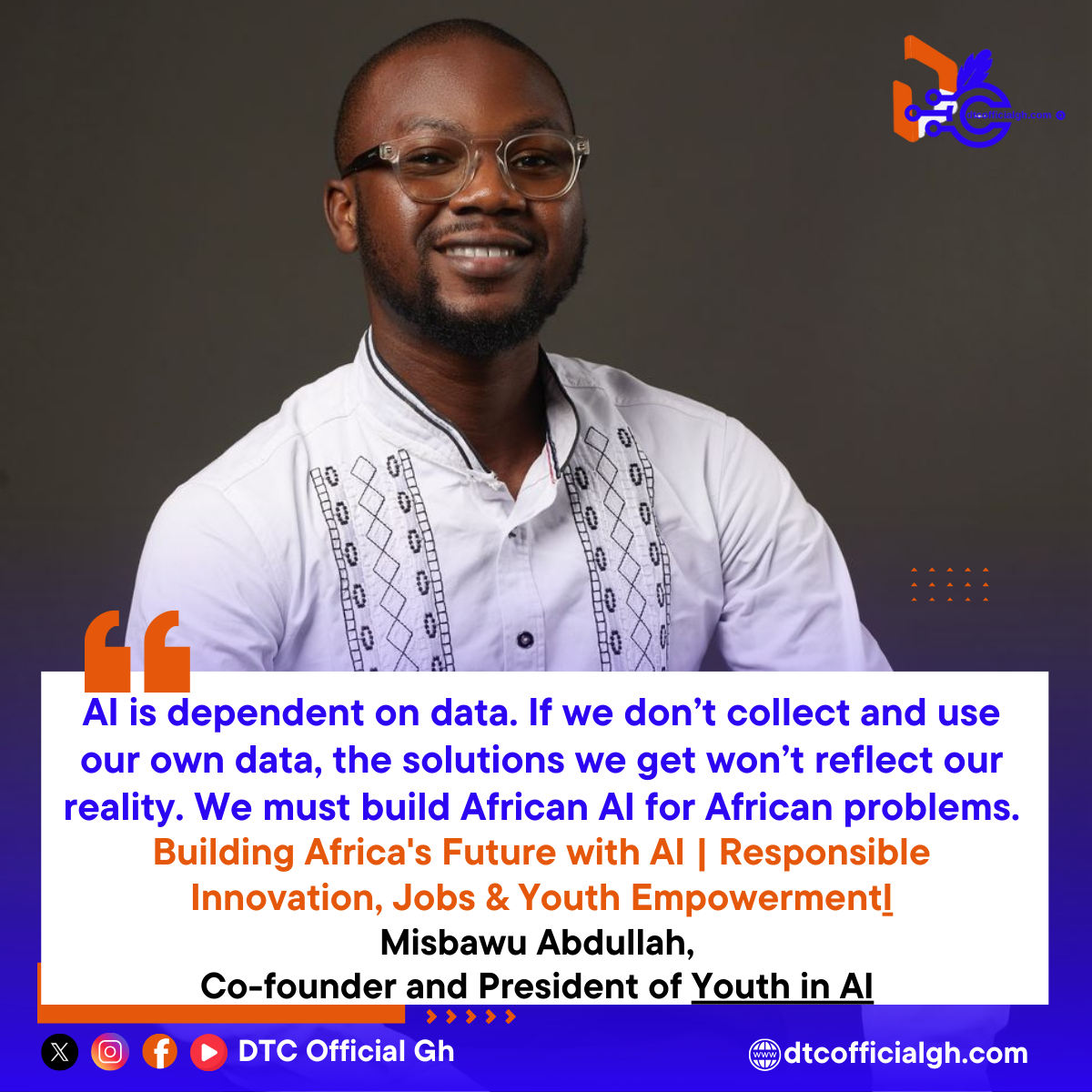Can Africa’s youth lead in shaping the future of Artificial Intelligence?

Artificial Intelligence (AI) is here to stay. It is changing how we work, learn, and even interact with one another. But one important question remains: Can young people lead the future of AI, especially in Africa?
That was the central theme in our recent interview with Misbawu Abdullah, Co-founder and President of Youth in AI, on DTC Official GH. In a thought-provoking discussion, he shed light on the challenges and opportunities AI presents for Africa’s youth.
👉 You can watch the full interview here: Can Youth Lead the Future of Artificial Intelligence?
The Call for Responsible AI
Misbawu believes that while AI offers immense opportunities, it also comes with serious risks. He compared it to the early days of the internet:
“With the advent of the internet, it was used to make the world a better place. But there were bad actors too, scammers and fraudsters. AI is no different. Some are cloning voices and spreading fake news. That’s why we need responsible AI use.”
For him, the solution lies in propagating the right use of AI, engaging governments for regulation, and educating young people about both its potential and its pitfalls.
READ ALSO: Youth in AI Launches Groundbreaking AI Lab at Google Research Accra
Jobs and the Future of Work
One of the hottest topics in any AI conversation is jobs. Will AI take over? Misbawu didn’t shy away from the reality:
“Even Microsoft admitted that AI now does about 30% of what their developers used to do. Some senior engineers are being replaced. The risk factor is great.”
But he added an important perspective:
“AI replaces those that don’t use it. If you’re not adapting, not reskilling, you’re at greater risk.”
In his view, the answer isn’t to fear AI but to embrace it as a tool. Youth must learn to adapt, innovate, and ride the wave of change rather than be swallowed by it.
MUST READ: How One Man Is Building Africa’s Gaming Industry from Scratch
The Launch of Ghana’s Youth in AI Lab
A major milestone for Youth in AI has been the launch of the Youth in AI Lab at Google’s Research Center in Ghana. Misbawu lit up when speaking about it:
“We realized it’s not just about awareness anymore. We need to create AI models for our problems. If we don’t solve our own problems, nobody will.”
Projects from the lab include:
- Ultrasound image segmentation for detecting liver diseases.
- AI-driven agricultural solutions, such as avocado disease detection.
The vision is clear: build African solutions for African challenges while keeping data ownership within the continent.

Africa’s Youth Advantage
Africa has the largest youthful population in the world, a fact often celebrated. But Misbawu cautioned that this could be both a blessing and a burden:
“If our youth are not skilled to deliver, it becomes a burden rather than an advantage.”
He stressed the need for a mindset shift, especially in education. While countries like China have made AI education compulsory in basic schools, Africa still lags.
“There should be life skills in basic school. We should teach the urgency of being ready for life, and digital skills should be integrated early. Things are changing rapidly, and our youth must be ready.”
For more insights and inspiring stories, kindly follow us on Twitter and WhatsApp for more.
A Vision for the Future
As our conversation wrapped up, Misbawu shared his vision of an Africa that owns its data, develops localized AI models, and empowers young people to lead.
“AI is dependent on data. If we don’t collect and use our own data, the solutions we get won’t reflect our reality. We must build African AI for African problems.”
READ ALSO: Now AI Designs Websites in Minutes! Is It Game Over for Web Designers?
Watch the Full Interview
This conversation was more than just a dialogue; it was a wake-up call for Africa’s youth, policymakers, and innovators.
👉 Watch the full interview here: Can Youth Lead the Future of Artificial Intelligence?
Don’t forget to like, comment, and subscribe to DTC Official GH for more conversations that shape Africa’s future.
For more insights and inspiring stories, kindly follow us on Twitter and WhatsApp for more.



